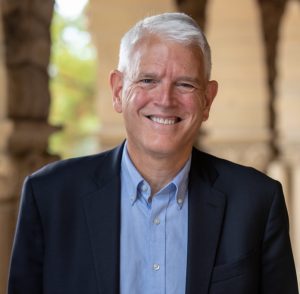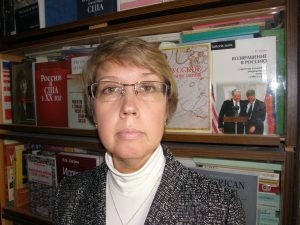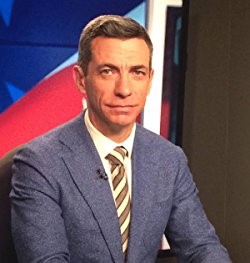Panel Discussion
A New START? Convergence and Confrontation in U.S. – Russia Relations
Zoom Webinar
Thursday, February 4, 2021 | 12:00 PM – 1:00 PM EST
On Tuesday, January 26th, Presidents Biden and Putin agreed in principle for a five-year extension to the New START agreement, the last remaining nuclear weapons control treaty between the U.S. and Russia. However, limiting the amount of strategic nuclear missiles is just one of the foreign policy issues that the Biden administration must resolve with Russia. Communication and deconfliction in Syria, action in the Arctic region, election meddling, the SolarWinds cyber-attack, the fate of political opposition leader Alexei Navalny are other areas that require diplomatic negotiation or addressing. Relations with Russia have been at a low point for years. What will it take to have positive movement in these critical places where each country’s policies collide? Tune in for a discussion of these questions and more on Thursday, February 4th from 12:00 PM to 1:00 PM ET, when we are joined by Amb. Steven Pifer, Research Fellow at the Robert Bosch Academy in Berlin, Victoria Zhuravleva, Chair of the Department of American Studies from the Russian State University for Humanities, and Clinton Watts, Distinguished Research Fellow at the Foreign Policy Research Institute.
COULDN’T ATTEND OUR EVENT? Don’t worry. You can watch its highlights below:
SPEAKERS:
Ambassador Steven Pifer
 Ambassador Steven Pifer is a research fellow at the Robert Bosch Academy in Berlin. He is also affiliated with Stanford’s Center for International Security and Cooperation and the Brookings Institution.
Ambassador Steven Pifer is a research fellow at the Robert Bosch Academy in Berlin. He is also affiliated with Stanford’s Center for International Security and Cooperation and the Brookings Institution.
A retired U.S. Foreign Service officer, Pifer’s more than 25 years with the Department of State focused on relations with the former Soviet Union and Europe, as well as arms control and security issues. He served as a deputy assistant secretary with responsibilities for Russia and Ukraine, ambassador to Ukraine, and special assistant to the president and senior director for Russia, Ukraine and Eurasia on the National Security Council. He also served at the U.S. embassies in Warsaw, Moscow and London, and with the U.S. delegation to the negotiation on intermediate-range nuclear forces in Geneva.
Victoria I. Zhuravleva
 Victoria I. Zhuravleva is a Doctor of Science (History), a Professor of History and International Relations, Chair of the Department of American Studies from the Russian State University for the Humanities, Moscow, Russia. Her field of research interests is American history with a specialization in Russian-American relations and U.S. foreign policy. She is author of fundamental book Understanding Russia in the United States: Images and Myths (in Russian, 2012), co-author of the text-book World History of the 20th Century (in Russian, 2002), co-author of the volume Russia and the US: Diplomatic Relations. 1900-1917 (in Russian, 2009). She is editor of several volumes on History and Imagology of Russian-American relations as well as on American History, including Russian-American Relations in Past and Present: Images, Myths, and Reality (in Russian, 2007), Abraham Lincoln: Lessons of History and the Contemporary World (in Russian, 2010), co-editor (with Ivan Kurilla) of Russia and the United States: Mutual Representations in Textbooks (in Russian, 2009) and Russian/Soviet Studies in the United States, Amerikanistika in Russia: Mutual Representations in Academic Projects (Lexington Books, 2016). Victoria Zhuravleva is a member of editorial board of such academic journals as Amerikanskii ezhegodnik (The American Year-Book), Sravnitel’naia politika (Comparative Politics); Vestnik RGGU (RSUH/RGGU Bulletin. Series: Politics. History. International Relations. Area Studies), Journal of Russian-American Studies (JRAS). She is an alumna of the Fulbright Program and the Kennan Institute Program.
Victoria I. Zhuravleva is a Doctor of Science (History), a Professor of History and International Relations, Chair of the Department of American Studies from the Russian State University for the Humanities, Moscow, Russia. Her field of research interests is American history with a specialization in Russian-American relations and U.S. foreign policy. She is author of fundamental book Understanding Russia in the United States: Images and Myths (in Russian, 2012), co-author of the text-book World History of the 20th Century (in Russian, 2002), co-author of the volume Russia and the US: Diplomatic Relations. 1900-1917 (in Russian, 2009). She is editor of several volumes on History and Imagology of Russian-American relations as well as on American History, including Russian-American Relations in Past and Present: Images, Myths, and Reality (in Russian, 2007), Abraham Lincoln: Lessons of History and the Contemporary World (in Russian, 2010), co-editor (with Ivan Kurilla) of Russia and the United States: Mutual Representations in Textbooks (in Russian, 2009) and Russian/Soviet Studies in the United States, Amerikanistika in Russia: Mutual Representations in Academic Projects (Lexington Books, 2016). Victoria Zhuravleva is a member of editorial board of such academic journals as Amerikanskii ezhegodnik (The American Year-Book), Sravnitel’naia politika (Comparative Politics); Vestnik RGGU (RSUH/RGGU Bulletin. Series: Politics. History. International Relations. Area Studies), Journal of Russian-American Studies (JRAS). She is an alumna of the Fulbright Program and the Kennan Institute Program.
Clint Watts
 Clint Watts is a Distinguished Research Fellow at the Foreign Policy Research Institute, Non-Resident Fellow at the Alliance for Securing Democracy. He is also a national security contributor for NBC News and MSNBC. His research and writing focuses on terrorism, counterterrorism, social media influence and Russian disinformation. Clint’s tracking of terrorist foreign fighters allowed him to predict the rise of the Islamic State over al Qaeda in 2014. From 2014 – 2016, Clint worked with Andrew Weisburd and J.M. Berger to track and model the rise of Russian influence operations via social media leading up to the U.S. Presidential election of 2016. This research led Clint to testify before four different Senate committees in 2017 and 2018 regarding Russia’s information warfare campaign against the U.S. and the West. Clint’s writing has appeared in a range of publications to include the New York Times, Washington Post, Foreign Affairs, Foreign Policy, The Daily Beast, Politico, Lawfare, War On The Rocks and the Huffington Post. Before becoming a consultant, Clint served as a U.S. Army infantry officer, a FBI Special Agent, as the Executive Officer of the Combating Terrorism Center at West Point (CTC), as a consultant to the FBI’s Counter Terrorism Division (CTD) and National Security Branch (NSB), and as an analyst supporting the U.S. Intelligence Community and U.S. Special Operations Command.
Clint Watts is a Distinguished Research Fellow at the Foreign Policy Research Institute, Non-Resident Fellow at the Alliance for Securing Democracy. He is also a national security contributor for NBC News and MSNBC. His research and writing focuses on terrorism, counterterrorism, social media influence and Russian disinformation. Clint’s tracking of terrorist foreign fighters allowed him to predict the rise of the Islamic State over al Qaeda in 2014. From 2014 – 2016, Clint worked with Andrew Weisburd and J.M. Berger to track and model the rise of Russian influence operations via social media leading up to the U.S. Presidential election of 2016. This research led Clint to testify before four different Senate committees in 2017 and 2018 regarding Russia’s information warfare campaign against the U.S. and the West. Clint’s writing has appeared in a range of publications to include the New York Times, Washington Post, Foreign Affairs, Foreign Policy, The Daily Beast, Politico, Lawfare, War On The Rocks and the Huffington Post. Before becoming a consultant, Clint served as a U.S. Army infantry officer, a FBI Special Agent, as the Executive Officer of the Combating Terrorism Center at West Point (CTC), as a consultant to the FBI’s Counter Terrorism Division (CTD) and National Security Branch (NSB), and as an analyst supporting the U.S. Intelligence Community and U.S. Special Operations Command.
We are trying our best to keep our community informed about foreign affairs, and we would appreciate if you can support us to keep this virtual briefing series going. No amount is too small

